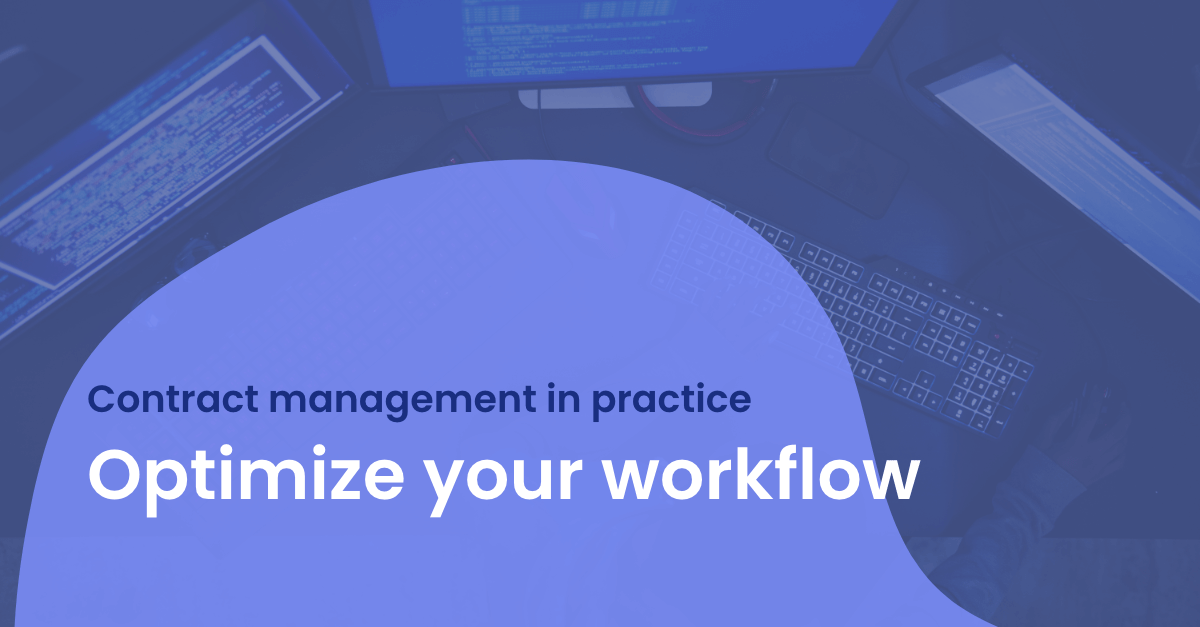Contract Management | A Practical Approach
Optimize your contract management and improve your workflows.

- Articles
- Contract Management
- Contract Management in practice
Keeping track of contracts and obligations is a challenge for many organisations, especially those working with large volumes or complex contracts. This is where contract management comes in. By prioritising contract management, companies can ensure that they get the most out of their contracts, both financially and in terms of quality.
Benefits of contract management
Organisations that focus on contract management can benefit from increased visibility and control over their contract processes. This leads to better follow-up on commitments and agreements, potentially resulting in financial gains. Furthermore, contracts will follow the same format and contain all necessary information, increasing quality and efficiency.
Contract management is a critical function for organisations dealing with contracts. Here are some important facts about contract management:
1. contract management covers the entire contract lifecycle, from creation to termination or expiry.
2. Contract management is essential to ensure compliance with legal and regulatory requirements.
3. Contract management can help minimise risk for businesses and ensure better financial performance.
4. Contract management can help optimise processes and streamline workflows, leading to savings in time and costs.
5. Contract management requires a detailed understanding of the content of the contract and the requirements for follow-up and reporting.
6. Contract management often involves multiple stakeholders, including legal, financial and operational teams.
7. Contract management often requires the use of specialised software solutions to ensure quality.
Implementing work processes
A key element of contract management is to focus on the contracts lifecycle. This process covers all aspects of a contract from signing to archiving and takes into account the many interfaces within a single agreement. Organisations can implement workflows that take into account all these interfaces and ensure more efficient and streamlined contract management. Implementing contract processes requires a detailed understanding of the company's specific requirements and needs. This may include developing standardised contract forms, implementing automated approval processes and creating a central repository for all contracts.
It is important to ensure that all stakeholders in the business are involved in the contract process to ensure a consistent approach to contract management across the organisation. This can include education and training of employees to ensure they have the necessary knowledge and skills to manage contracts in an efficient and responsible manner. In this way, the post-contractual process is standardised, thereby increasing the quality of agreements and knowledge in the organisation.
Contract Management Systems
With a Contract Management system, organisations can remind the relevant parties of their obligations at the right times, facilitating the management of obligations from one or more contracts. These systems also help to improve the overview of the contract portfolio and ensure that all parties are aware of their responsibilities and deadlines. A number of best practices can be implemented in the Contract system so that it is easy for parties to know how to manage each obligation.
Key features of a contract solution
To ensure an efficient contract solution, it is important to have a commitment engine and standards that standardise agreements so that quality and efficiency are prioritised together. In addition, systems should have an engine that monitors the fulfilment of all parts of the process and ensures that nothing falls between two stools.
Negotiation and dispute resolution
Another important part of contract management is preparing and managing the negotiation of contractual terms and conditions, as well as resolving any disputes that may arise during the lifetime of the contract. By having effective processes and tools in place, organisations can ensure that they are able to deal with disputes in a timely and constructive manner, which can help maintain good relations with customers and suppliers.
Contract management system
Technologies can play a big role in improving contract management. For example, organisations can benefit from automation to reduce manual processes and errors, increasing efficiency and accuracy. In addition, cloud-based solutions can allow employees to access contracts and related information from any device and location, promoting collaboration and visibility.
Change management in contracts
As conditions and circumstances can change over time, it is important that organisations have processes in place to manage changes to contracts. This may include updating contract terms, adding annexes, or extending the duration of the contract. An effective change management process ensures that all parties are aware of changes and understand their significance.
Conclusion
By prioritising contract management and implementing the best workflows, companies can achieve better oversight, increased efficiency and potentially financial gains. It is therefore important for companies to recognise the value of investing time and resources in contract management and choose the right systems and tools to support their work. This will help them ensure they get the most out of their contracts and build strong relationships with their customers and suppliers.
Do you need help with your Contract process. PACTIUS Contract Management is built to help organisations with their contract work, read more about PACTIUS here or book a demo and hear how PACTIUS can help your organisation.
GDPR Compliance Software




.jpeg)

.jpg)
.jpg)



.jpg)

-1.png)



.jpeg)








.jpg)





Info
.legal A/S
hello@dotlegal.com
+45 7027 0127
VAT-no: DK40888888
Support
support@dotlegal.com
+45 7027 0127
Need help?
Let me help you get started

+45 7027 0127 and I'll get you started
.legal is not a law firm and is therefore not under the supervision of the Bar Council.







